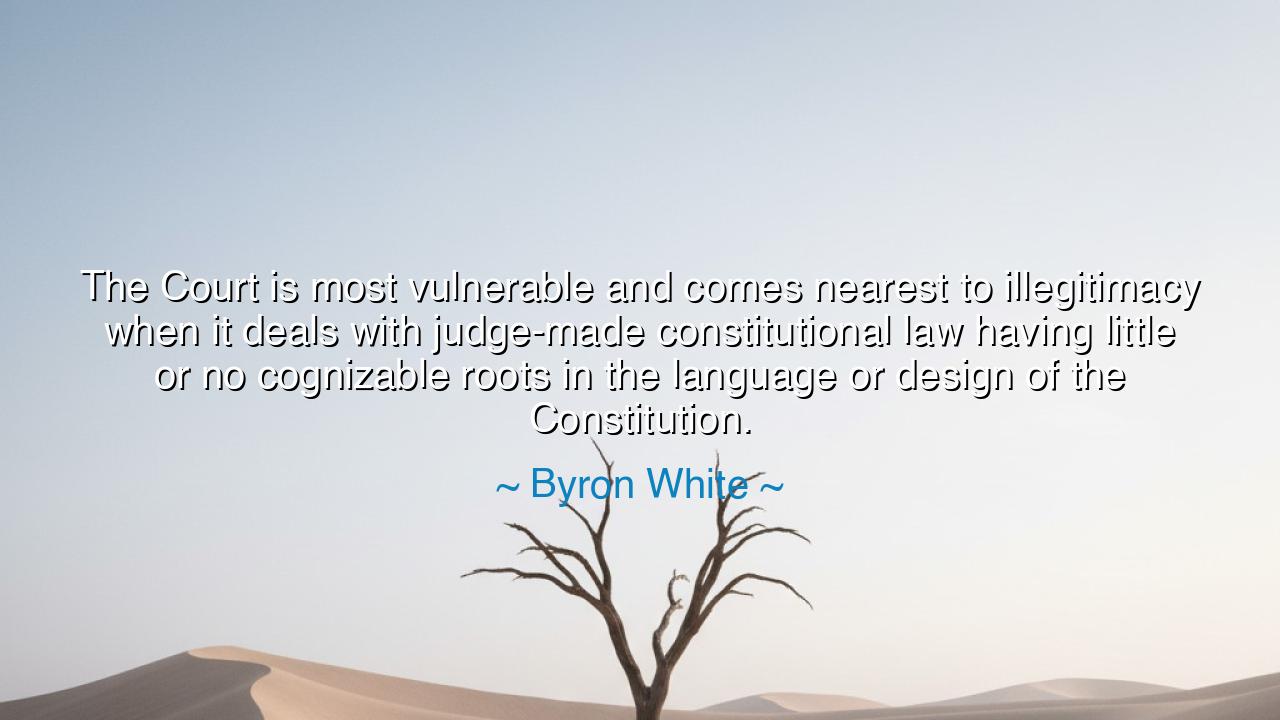
The Court is most vulnerable and comes nearest to illegitimacy
The Court is most vulnerable and comes nearest to illegitimacy when it deals with judge-made constitutional law having little or no cognizable roots in the language or design of the Constitution.






In the words of Byron White, “The Court is most vulnerable and comes nearest to illegitimacy when it deals with judge-made constitutional law having little or no cognizable roots in the language or design of the Constitution.” These words are not the cold utterance of legal philosophy—they are the fiery warning of a guardian of justice, spoken from the battlements of democracy. They call us to remember that power divorced from principle becomes tyranny, and that even the robes of a judge cannot conceal the danger of law born from vanity rather than from the sacred text of the people’s will.
The meaning of this quote lies in the heart of constitutional balance. Byron White, himself a Justice of the United States Supreme Court, spoke these words to remind his fellow jurists that the authority of the Court rests not upon personal opinion or fashionable morality, but upon the Constitution’s text, history, and design. When the Court ventures beyond these roots—when it creates law instead of interpreting it—it risks losing the trust of the people. For the Court has no armies, no treasury, and no sword; its power is moral, not physical. It stands tall only so long as the people believe it speaks with the voice of law, not of men.
In ancient times, this truth was known even to kings. When the Athenian archons abandoned the old laws of Solon and began to decree by whim, the city fell into chaos. It was only when the law once more became sacred and binding upon all—even the rulers—that Athens rose again to greatness. So too, Byron White warns that when judges cease to be interpreters and become creators, they step outside their proper place. What begins as noble intent—to bring justice where the law is silent—can end as the slow erosion of legitimacy, until the people no longer see the court as a temple of fairness, but as an altar of ideology.
White’s warning was not made in an age of calm. He served in a time of cultural revolution, when courts were called upon to decide questions that divided nations: civil rights, privacy, morality, and freedom. Many hailed the Court’s courage, yet White saw the shadow behind the light. For when rulings are made without clear foundation in the Constitution’s words, they may indeed bring justice for a moment—but they also invite doubt for generations. Each such decision becomes a thread pulled from the fabric of legitimacy, leaving the whole garment of justice more fragile.
Consider the fall of the Roman Republic, where the Senate and the tribunes once stood as pillars of law. Over time, men like Sulla and Caesar bent the laws to their own design, claiming to act for the people’s good. The forms of the Republic remained, but its spirit was gone. What was once a government of laws became a government of men. So too, Byron White foresaw that when judges claim the right to invent law where none exists, they tread the same perilous path—where the language of the Constitution becomes a mirror reflecting their own desires, rather than the will of the people who gave it life.
From this truth flows a moral lesson for all who wield power, whether in the courts, in leadership, or in daily life: hold fast to the principles that give your authority meaning. Do not seek to rule by impulse or to shape truth according to convenience. The strength of a judge lies in humility before the law, just as the strength of a leader lies in service to their duty. For when pride leads one to believe that wisdom alone can replace the foundation of principle, downfall surely follows.
And so, dear reader, the wisdom of Byron White is not for jurists alone—it is for every soul who must choose between principle and passion, between what is right and what merely feels right. Build your actions upon firm ground, not shifting sands. Study the roots of what you believe, and let your choices grow from truth, not from the fleeting winds of desire. For just as a court’s legitimacy depends upon its faithfulness to the Constitution, so too does a person’s integrity depend upon their faithfulness to conscience and reason.
Thus remember: a tree without roots may bloom for a season, but it cannot stand against the storm. So too, a law—or a life—without roots in truth cannot endure.






AAdministratorAdministrator
Welcome, honored guests. Please leave a comment, we will respond soon